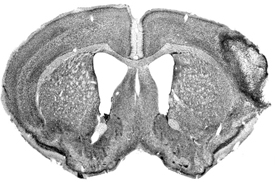Study of How Brain Corrects Perceptual Errors Has Implications For Brain Injuries, Robotics
“Don’t you wonder sometimes about sound and vision?” — David Bowie
New research provides the first evidence that sensory recalibration — the brain’s automatic correcting of errors in our sensory or perceptual systems — can occur instantly.
“Until recently, neuroscientists thought of sensory recalibration as a mechanism that is primarily used for coping with long-term changes, such as growth during development, brain injury or stroke,” said Ladan Shams, a UCLA assistant professor of psychology and an expert on perception and cognitive neuroscience. “It appeared that extensive time, and thus many repetitions of error, were needed for mechanisms of recalibration to kick in. However, our findings indicate we don’t need weeks, days, or even minutes or seconds to adapt. To some degree, we adapt instantaneously. (more…)

